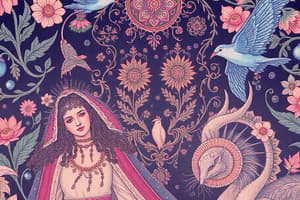Podcast
Questions and Answers
What is a distinguishing feature of short stories compared to novels?
What is a distinguishing feature of short stories compared to novels?
- Short stories have multiple plots
- Short stories involve complex themes
- Short stories have fewer characters (correct)
- Short stories are longer in length
Which literary work is an example of a famous short story collection?
Which literary work is an example of a famous short story collection?
- War and Peace by Leo Tolstoy
- Pride and Prejudice by Jane Austen
- Tales of Mystery and Imagination by Edgar Allan Poe (correct)
- The Great Gatsby by F. Scott Fitzgerald
What distinguishes novels from short stories?
What distinguishes novels from short stories?
- Novels focus on one event or situation
- Novels are shorter in length than short stories
- Novels have fewer characters than short stories
- Novels have over forty thousand words and multiple plots (correct)
Which form of fiction allows authors to explore complex issues and situations?
Which form of fiction allows authors to explore complex issues and situations?
What literary form involves imaginary events and characters invented by the author?
What literary form involves imaginary events and characters invented by the author?
What is the main difference between drama and novels according to the text?
What is the main difference between drama and novels according to the text?
Which genre relies on characters, places, or events representing hidden meanings or metaphors?
Which genre relies on characters, places, or events representing hidden meanings or metaphors?
In drama, what is used extensively to create the setting and mood of the story?
In drama, what is used extensively to create the setting and mood of the story?
Which novel by George Orwell is mentioned as an example of allegorical fiction in the text?
Which novel by George Orwell is mentioned as an example of allegorical fiction in the text?
What is the structure often followed in plays, as mentioned in the text?
What is the structure often followed in plays, as mentioned in the text?
Flashcards are hidden until you start studying
Study Notes
Fiction
Fiction is a genre of literature that involves imaginary events and characters invented by the author. It is often contrasted with non-fiction, which deals with real people, places, and events. Fiction can take many forms and encompasses various literary devices and styles. This article will discuss four types of fiction: short stories, novels, drama, and allegories. Each form has its own unique elements that contribute to the overall narrative.
Short Stories
Short stories are brief narratives usually ranging from one thousand to ten thousand words. They typically focus on a single event or situation and involve fewer characters than a novel. Despite their brevity, they can still convey powerful messages and emotions. Short stories often require a high level of skill from writers because condensing an idea into such a small space requires careful planning and execution. Some famous examples of short story collections include Edgar Allan Poe's "Tales of Mystery and Imagination" and "The Collected Stories" by Ernest Hemingway.
Novels
Novels represent the longest and most complex form of fictional writing. They consist of over forty thousand words, usually more. A typical modern novel today ranges between 80,000 to 100,000 words. Unlike short stories, novels have multiple plots and plot lines, along with numerous characters who interact with each other. These works of fiction allow authors to delve deeper into their themes and explore complex issues and situations. Examples of classic novels include "Pride and Prejudice" by Jane Austen and "To Kill a Mockingbird" by Harper Lee.
Drama
Drama is a genre of fiction intended for performance on stage or screen, which can include plays and screenplays. Unlike novels and short stories, drama relies heavily on dialogue to convey the story. This genre also relies on physical expression such as facial expressions, body movements, and stage design to create the setting and mood of the story. The structure of a play usually follows the three-act structure, where Act I introduces the main conflict, Act II represents the development of the conflict, and Act III shows the resolution of the conflict.
Allegory
An allegory is a story in which characters, places, or events represent hidden meanings or metaphors. Allegorical fiction often uses symbolism and metaphor to convey deeper messages or themes. The characters and events in an allegory do not necessarily correspond to anything real, but instead serve as vehicles for representing abstract concepts or ideas. One common example of allegorical fiction is "Animal Farm" by George Orwell, where farm animals symbolize aspects of human society and politics.
In conclusion, fiction encompasses a wide range of genres that allow authors to express themselves creatively and convey themes through unique narratives. From the concise brevity of short stories to the intricate complexity of novels, and from the physical performances of drama to the hidden meanings of allegory, there is always something new and fascinating within the realm of fiction.
Studying That Suits You
Use AI to generate personalized quizzes and flashcards to suit your learning preferences.




